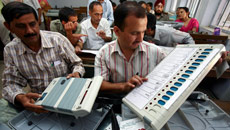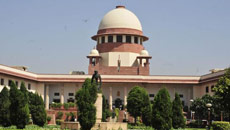Narendra Modi is not far off the mark when he says that the May 16 results will be the Congress's worst.
Drawing room and tea-stall chatter nowadays centres on whether the 128-year-old no longer a Grand Old Party will be able to reach the 100-seat mark in the 545-member Lok Sabha in which two MPs are nominated.
It must be mortifying for the Congress that this figure has become something of a psychological marker. There will be a faint sigh of relief in its portals if the party can cross it, and a precipitous plunge into despair if it cannot.
Yet, only three decades ago, when the party won 415 seats in 1984, few would have thought that such a low benchmark would become a crucial reference point for it.
The only consolation for the Congress will be that such wild swings of fortune are not unknown in Indian politics. After all, the Bharatiya Janata Party (BJP), which is on the verge of recording its best ever performance, won only two seats in 1984.
If anything, these fluctuations show that a stable two-party system is yet to emerge in the country, as in the West.
For the Congress, however, the focus has to be on the post-poll scenario since a defeat is staring it in the face. More than the future of the party, its members and supporters must be wondering about the fate of the dynasty. Will it gradually fade away or will be it be able to lift itself by the bootstraps to face the challenges which it never anticipated ?
Since four generations of the Nehru-Gandhi family - from Jawaharlal Nehru to Indira Gandhi, Rajiv and Sonia Gandhi and Rahul Gandhi - have been the mainstay of the Congress, it will not be easy for the party to cut its umbilical links all of a sudden.
The expectation is that not only will the party men feel like orphans in the dynasty's absence, unable to think and decide for themselves, but that there will be no one to keep them from indulging in fratricidal warfare - a role which only the family was capable of playing.

During the Congress's earlier periods of trouble, as the 1977 defeat in the aftermath of the Emergency, or the 1989 setback because of the Bofors howitzer scam, the party was fortunate in having charismatic family members like Indira and Rajiv to help it to claw back to power. If Rajiv hadn't been assassinated in 1991, it is quite possible that the Congress's 1991-96 stint would have been further prolonged.
At present, however, neither Sonia nor her son, Rahul, can claim the kind of charisma and popularity for which Indira and Rajiv were known. To make matters worse, their economic outlook is not in sync with the post-liberalization India, where individual initiative has greater salience in an atmosphere of capitalist enterprise in contrast to the family's earlier emphasis on a public sector-driven controlled economy.
Ironically, it is the Congress's arch-opponent, Modi, who has taken advantage of the prevailing mood of free enterprise although it is the Congress's prime minister, Narasimha Rao, who opened up the economy in 1991.
Is the fact of Rao not being a family member (though a loyal Congressman) a cause of annoyance to the family's feudal instincts, making it virtually disown the economic reforms which he started?
It is no secret that Sonia's disinterest in the reforms inhibited the Manmohan Singh government from energetically pushing them forward, thereby slowing down the growth rate in the last few years. The sluggishness could not but have pleased Aruna Roy, a member of the left-of-centre National Advisory Council (NAC) led by Sonia, who had been bemoaning the government's emphasis on growth.
Since charisma is much more than just being good-looking, the family will have to come to grips with the changes that have taken place since Sonia learnt her first lessons in realpolitik in Indira's household and Rahul came of age. The major change is that socialism has become "outdated", as Manmohan Singh said, probably in sorrow, because the doctrine has a fairly high number of followers in India.
They are present not only in the communist parties, but also in the academia and in the NAC. It is the "inputs" which this outfit gave to Sonia which derailed the reforms process. The Congress itself has a number of socialists in its ranks, including Defence Minister A.K. Antony and the Kerala unit, which refused to allow foreign investment in the retail sector in the state.

If the Congress is to have some chance of success in the election after the forthcoming one, which may be earlier than in 2019, it has to pay heed to Amartya Sen's call for a right-wing, market-oriented, secular party. For an avowed leftist like the Nobel laureate to take this line is probably an appeal to the Congress.
If the Congress pays no attention, the field will be left open for a right-wing, market-oriented party which cannot be called secular.





